About Bwiti Culture
What is Bwiti?
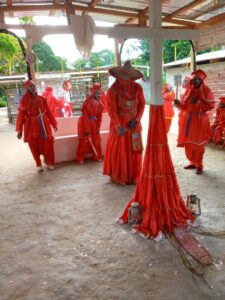 The Bwiti culture is an indigenous religious and spiritual tradition that originated in the forest regions of Central Africa, particularly in Gabon, Cameroon, and the Republic of Congo. The Bwiti tradition centers around the use of the iboga plant, which is considered a sacred and powerful medicine that can offer spiritual and physical healing, guidance, and insight.
The Bwiti culture is an indigenous religious and spiritual tradition that originated in the forest regions of Central Africa, particularly in Gabon, Cameroon, and the Republic of Congo. The Bwiti tradition centers around the use of the iboga plant, which is considered a sacred and powerful medicine that can offer spiritual and physical healing, guidance, and insight.
The Bwiti religion is characterized by a deep reverence for the natural world and the spirits that inhabit it, and the belief that all things are connected in a sacred web of life. Bwiti ceremonies often involve elaborate music, dance, and ritual, and are designed to bring participants into a state of deep introspection and communion with the spiritual world.
The Bwiti tradition also places a strong emphasis on community, with a deep respect for elders and ancestors, and a strong sense of shared responsibility for the well-being of the community as a whole. Bwiti communities are often organized into lodges or clans, and are led by knowledgeable and respected spiritual leaders.
The Bwiti culture has a rich history and a complex mythology, and is deeply intertwined with the history and ecology of the Central African rainforest. Despite the challenges of colonialism and modernization, the Bwiti tradition has persisted and continues to evolve and adapt in response to changing social and environmental conditions. Today, Bwiti communities can be found in many parts of the world, including Europe and North America, where the tradition has been transmitted and adapted by Bwiti practitioners who have migrated or been born outside of Africa
How old is Bwiti culture?
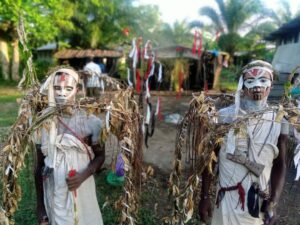 The exact age of the Bwiti tradition is difficult to determine, as it predates written history. However, it is believed to have originated many centuries ago in the forest regions of Central Africa, particularly in what is now Gabon, Cameroon, and the Republic of Congo.
The exact age of the Bwiti tradition is difficult to determine, as it predates written history. However, it is believed to have originated many centuries ago in the forest regions of Central Africa, particularly in what is now Gabon, Cameroon, and the Republic of Congo.
The use of iboga, the central sacrament of the Bwiti tradition, has been traced back to at least the 18th century. However, it is likely that the Bwiti tradition and the use of iboga have much older roots, possibly dating back thousands of years.
Over time, the Bwiti tradition has evolved and adapted in response to changing social and environmental conditions, including the arrival of European colonizers in the 19th and 20th centuries. Despite these challenges, the Bwiti tradition has persisted and continues to be practiced by communities throughout Central Africa and in other parts of the world.
Today, the Bwiti tradition and the use of iboga are increasingly recognized for their cultural and spiritual value, and efforts are underway to protect and promote the tradition while respecting the rights and autonomy of Bwiti communities.
What is a Bwiti nganga?
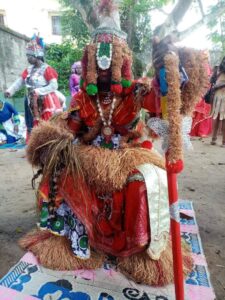 A Bwiti nganga is a spiritual leader or healer within the Bwiti tradition. The term “nganga” is often translated as “medicine person” English.
A Bwiti nganga is a spiritual leader or healer within the Bwiti tradition. The term “nganga” is often translated as “medicine person” English.
Ngangas are responsible for leading Bwiti ceremonies, providing spiritual guidance and healing, and transmitting the traditions and teachings of the Bwiti to future generations.
Ngangas are often selected for their role based on their natural abilities and aptitude for spiritual practice, and may undergo years of training and apprenticeship to develop their skills and knowledge. The training of a nganga typically involves learning the complex mythology and symbolism of the Bwiti tradition, as well as mastering the use of iboga and other sacred plants.
In addition to their role in spiritual practice, ngangas may also play important roles in the social and political life of Bwiti communities. They may serve as advisors to village chiefs, mediators in disputes, or advocates for the community’s interests.
Overall, the nganga is an integral part of the Bwiti tradition, and plays a critical role in preserving and transmitting the culture and knowledge of the Bwiti people.
What are the different branches of Bwiti?
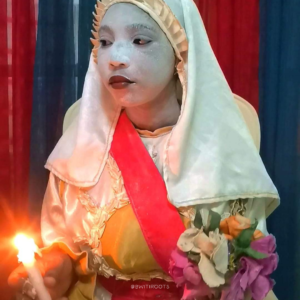 There are several different branches or lineages of the Bwiti tradition, each with their own unique history, teachings, and practices. Some of the major branches of Bwiti include:
There are several different branches or lineages of the Bwiti tradition, each with their own unique history, teachings, and practices. Some of the major branches of Bwiti include:Fang Bwiti: This is one of the oldest and most widespread branches of the Bwiti tradition, originating with the Fang people of Gabon and spreading throughout much of Central Africa. Fang Bwiti is characterized by a strong emphasis on ancestor worship and the use of iboga in healing and divination.
Myene Bwiti: This is another branch of Bwiti originating in Gabon, and is characterized by a focus on musical and dance traditions as well as the use of iboga in spiritual practice.
Fang-Ebak Bwiti: This is a hybrid lineage that emerged from the fusion of the Fang and Ebak Bwiti lineages. It is notable for its use of music, dance, and chanting in Bwiti ceremonies, as well as its emphasis on community-building and social justice.
Missoko Bwiti: This lineage originated in the coastal region of Gabon and is known for its use of a specific type of iboga known as missoko. Missoko Bwiti is characterized by a strong emphasis on healing and divination, and a focus on the interconnectedness of all things.
- Dissumba Bwiti: strong emphasis on ancestor worship, and its rituals often involve communicating with the spirits of ancestors and seeking their guidance and protection. The tradition also incorporates elements of nature worship, and its practitioners believe in the interconnectedness of all living things.
These are just a few examples of the many branches and lineages of the Bwiti tradition, each with their own unique history, teachings, and practices
How does music and dance play a role in Bwiti ceremonies, and what are some of the different musical styles and instruments used in these rituals?
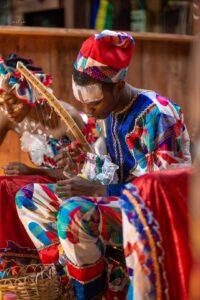 Music and dance are central to Bwiti ceremonies and play an important role in creating a spiritual and communal atmosphere. Bwiti practitioners believe that music and dance help to create a bridge between the physical and spiritual realms, and can facilitate communication with ancestors and other spiritual entities.
Music and dance are central to Bwiti ceremonies and play an important role in creating a spiritual and communal atmosphere. Bwiti practitioners believe that music and dance help to create a bridge between the physical and spiritual realms, and can facilitate communication with ancestors and other spiritual entities.
There are several different musical styles and instruments used in Bwiti ceremonies, depending on the specific lineage and the context of the ritual. Some of the most commonly used instruments include:
Ngombi: The ngombi is a harp-like instrument made from a hollowed-out log and several strings made from animal gut. It is often played during initiation ceremonies and is believed to have a powerful spiritual significance.
Mvet: The mvet is a type of zither that is used in some Bwiti lineages. It is believed to have originated with the Fang people of Gabon and is often associated with Fang Bwiti.
Mungongo: The mungongo is a type of trumpet made from an elephant tusk. It is used in some Bwiti lineages and is believed to have a powerful spiritual significance.
Drums: Various types of drums are used in Bwiti ceremonies, including the boungu and the ngoma. These instruments provide a rhythmic foundation for the music and are believed to help create a trance-like state.
In addition to these instruments, Bwiti music often features call-and-response vocals, with a lead singer improvising lyrics and the group responding with a chorus. The music is typically fast-paced and energetic, and is accompanied by dancing and other forms of movement. The music and dance serve to create a communal atmosphere and help participants to connect with each other and with the spiritual realm.
What are some of the key beliefs and values of the Bwiti tradition, and how do they shape the way that Bwiti practitioners live their lives?
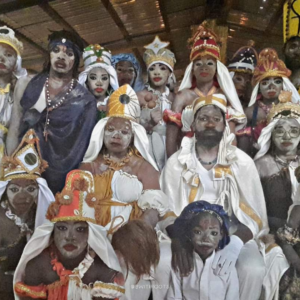 The Bwiti tradition is founded on a set of core beliefs and values that shape the way that practitioners live their lives and approach the world. Some of the key beliefs and values of the Bwiti tradition include:
The Bwiti tradition is founded on a set of core beliefs and values that shape the way that practitioners live their lives and approach the world. Some of the key beliefs and values of the Bwiti tradition include:
Reverence for the spiritual realm: Bwiti practitioners believe in the existence of a spiritual realm that is inhabited by ancestors, spirits, and other entities. They believe that this realm can be accessed through ritual practices and the use of psychoactive plants like iboga.
Communalism: Bwiti practitioners place a strong emphasis on community and social cohesion. They believe that individuals are interconnected and interdependent, and that the well-being of the community as a whole is just as important as the well-being of individuals.
Ancestor worship: Bwiti practitioners believe in the power and wisdom of their ancestors, and often incorporate ancestor worship into their rituals and practices.
Healing: Bwiti practitioners believe that the use of iboga and other traditional medicines can help individuals to heal physically, emotionally, and spiritually. They view healing as a holistic process that involves addressing imbalances and traumas in all aspects of a person’s life.
Personal growth: Bwiti practitioners believe that the use of iboga and participation in Bwiti ceremonies can help individuals to grow and develop personally and spiritually. They view life as a journey of self-discovery and seek to help individuals overcome obstacles and connect with their true selves.
These beliefs and values shape the way that Bwiti practitioners live their lives and approach the world. They encourage individuals to prioritize community, healing, and personal growth, and to view life as a journey of spiritual discovery. They also emphasize the importance of respect for the natural world, and of cultivating a deep connection with the spiritual realm.
How does Bwiti culture interact with other religious traditions and belief systems in Gabon and beyond, and what are some of the challenges that Bwiti practitioners face in this context?
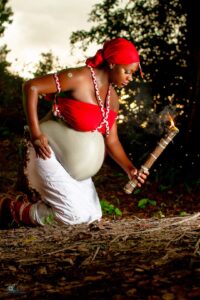 Bwiti culture in Gabon has coexisted with other religious traditions and belief systems for centuries, including Christianity, Islam, and traditional African religions. While there is some overlap between these traditions, they also have significant differences in their beliefs and practices.
Bwiti culture in Gabon has coexisted with other religious traditions and belief systems for centuries, including Christianity, Islam, and traditional African religions. While there is some overlap between these traditions, they also have significant differences in their beliefs and practices.
One of the challenges that Bwiti practitioners face in this context is the stigma and discrimination associated with their use of iboga, which is classified as a Schedule I drug in many countries, including the United States. Despite the fact that iboga has been used for centuries in Bwiti ceremonies as a tool for spiritual exploration, personal growth, and healing, many governments and religious organizations view it as a dangerous and illicit substance.
Bwiti practitioners also face challenges in interacting with other religious traditions, particularly those that are more mainstream and dominant in society. While Bwiti has been recognized as a legitimate religion in Gabon since 2000, it is still not widely accepted or understood by many people in the country, and Bwiti practitioners may face discrimination or ostracism because of their beliefs and practices.
At the same time, Bwiti culture has also spread beyond Gabon to other parts of the world, and there are now Bwiti communities and practitioners in other countries, including the United States and Europe. This has led to new challenges and opportunities for Bwiti practitioners, as they navigate different cultural contexts and work to build bridges between Bwiti and other spiritual traditions.
Bwiti culture and its practitioners continue to face a range of challenges in the context of globalization and the spread of mainstream religions and cultures. However, many Bwiti practitioners are working to preserve and promote their traditions and to build connections with other spiritual communities, in the hope of creating a more inclusive and understanding world.
How has Bwiti culture been impacted by globalization and modernization, and what are some of the challenges and opportunities facing Bwiti practitioners today?
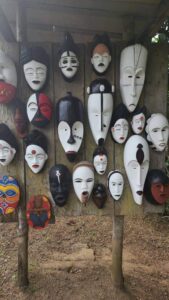 Bwiti culture has been impacted by globalization and modernization in a number of ways. On the one hand, globalization has increased awareness and interest in Bwiti practices among people from around the world, leading to greater recognition and appreciation of this cultural tradition. This has also created new opportunities for Bwiti practitioners to share their knowledge and practices with a wider audience, and to connect with other like-minded individuals and groups.
Bwiti culture has been impacted by globalization and modernization in a number of ways. On the one hand, globalization has increased awareness and interest in Bwiti practices among people from around the world, leading to greater recognition and appreciation of this cultural tradition. This has also created new opportunities for Bwiti practitioners to share their knowledge and practices with a wider audience, and to connect with other like-minded individuals and groups.
However, globalization and modernization have also brought a number of challenges to Bwiti culture. One of the biggest challenges is the loss of traditional knowledge and practices, as younger generations become more assimilated into modern society and less interested in maintaining traditional ways of life. This is particularly true in urban areas, where younger Bwiti practitioners may be more influenced by Western culture and less connected to their traditional roots.
Another challenge is the impact of modernization on the natural environment. Many of the plants and animals used in Bwiti rituals are endangered or threatened due to habitat loss, overharvesting, and other environmental pressures. This has led to concerns about the sustainability of Bwiti practices, and the need to find new ways to protect and preserve the natural resources that are essential to these traditions.
Finally, globalization has also created new legal and regulatory challenges for Bwiti practitioners. The use of iboga, a key sacrament in Bwiti rituals, is illegal in many countries outside of Gabon and other African countries, which can make it difficult for Bwiti practitioners to practice their traditions and share their knowledge with others.
Despite these challenges, there are also many opportunities for Bwiti practitioners to adapt and evolve their traditions in response to the changing world around them. This may include incorporating new technologies and approaches into their practices, forging new partnerships and collaborations with other groups and organizations, and finding new ways to connect with younger generations and share their knowledge and practices with a wider audience.